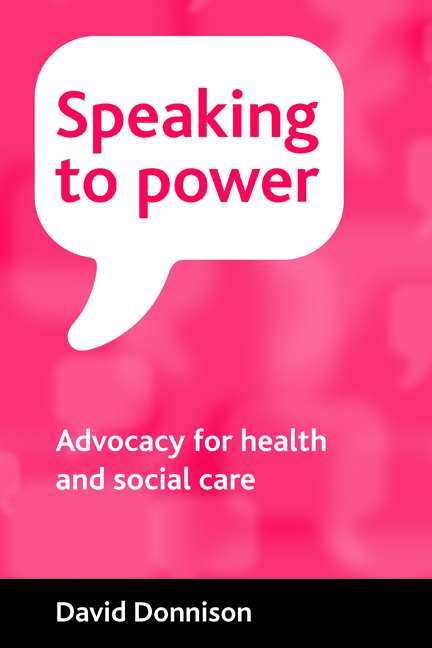Book contents
- Frontmatter
- Dedication
- Contents
- Why and how we wrote this book
- Introduction
- one Origins of advocacy
- two Scotland gives a lead
- three What advocates do: their main clients
- four What advocates do: questions and dilemmas
- five Groups and communities
- six Setting up an advocacy project and running it
- seven Volunteers
- eight Making advocacy accountable
- nine Roadblocks
- ten Looking ahead
- Further reading
- Index
eight - Making advocacy accountable
Published online by Cambridge University Press: 05 July 2022
- Frontmatter
- Dedication
- Contents
- Why and how we wrote this book
- Introduction
- one Origins of advocacy
- two Scotland gives a lead
- three What advocates do: their main clients
- four What advocates do: questions and dilemmas
- five Groups and communities
- six Setting up an advocacy project and running it
- seven Volunteers
- eight Making advocacy accountable
- nine Roadblocks
- ten Looking ahead
- Further reading
- Index
Summary
Why should advocacy be evaluated?
Every public service should be evaluated from time to time to make sure it is doing its job properly. But those paid by their fellow citizens to act as advocates for people who may be very frail and engaged in conflicts with powerful authorities have a special duty to show that they are doing their best to serve their clients in an independent, well-informed and skilful way, without conflicting interests. That duty weighs particularly heavily on them in Scotland where the agencies they work for usually have a monopoly of reasonably secure public funding for this kind of work in the territory they cover. Although their contracts could be transferred to other advocacy agencies at some rather distant point in the future, they are not exposed to the daily discipline of competing for customers in a market place. These are privileges that most voluntary agencies can only dream of.
People working in this field in England and Wales and in the US have prepared ‘charters’ and long lists of tests that advocacy agencies should pass to show they maintain proper ‘quality standards’. They can afford to be rigorous because advocacy is growing slowly – usually for particular groups of clients in particular areas. Meanwhile the spokesmen of government, offering tempting hopes of more secure funding at some point in the future, have pressed advocates to organise training courses leading to accreditation – accreditation that would give successful candidates membership of a professional institute that would assure the world of their competence; accreditation that could also be withdrawn if they failed to maintain the proper standards. This has long been the route taken by public service professions – doctors, midwives, social workers and many others – to gain recognition and a place on the public payroll. Some advocates hope eventually to follow their example. Others have resisted that idea, arguing that advocates should not try to become a profession of that kind. We will discuss these arguments at the end of this chapter.
Scotland's way – so far
When the new Scottish government set up an advocacy service for people with mental health disorders under the 2003 Act, it did this by requiring local social work and health authorities to commission voluntary agencies to provide the service and get it up and running by October 2005.
- Type
- Chapter
- Information
- Speaking to PowerAdvocacy for Health and Social Care, pp. 125 - 138Publisher: Bristol University PressPrint publication year: 2009



